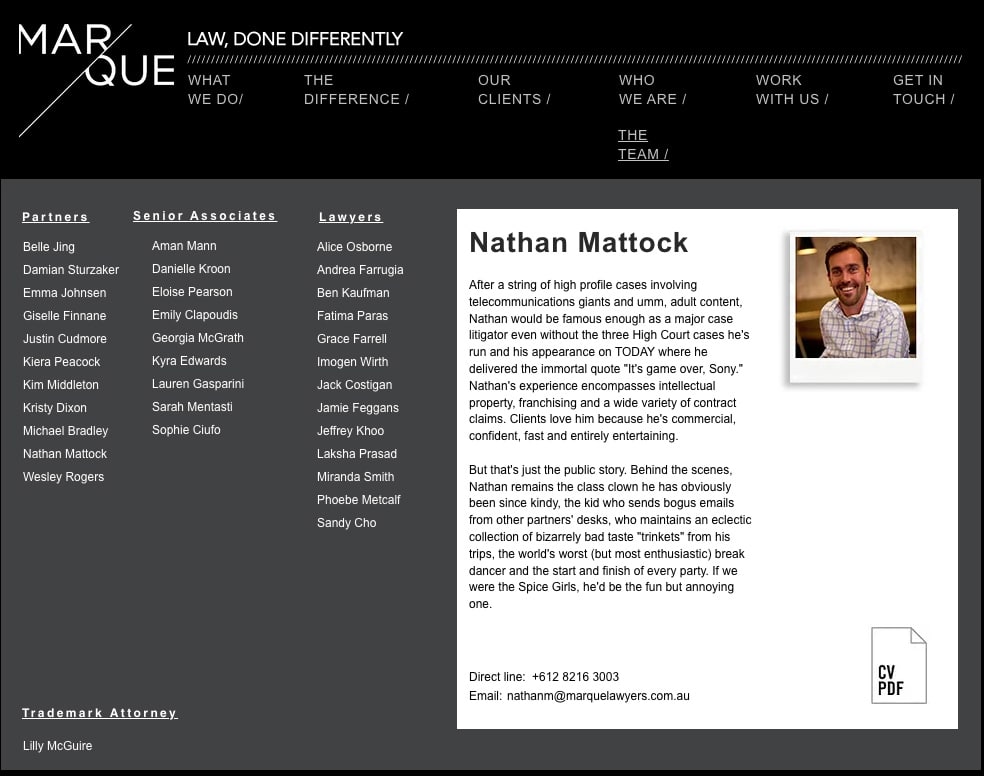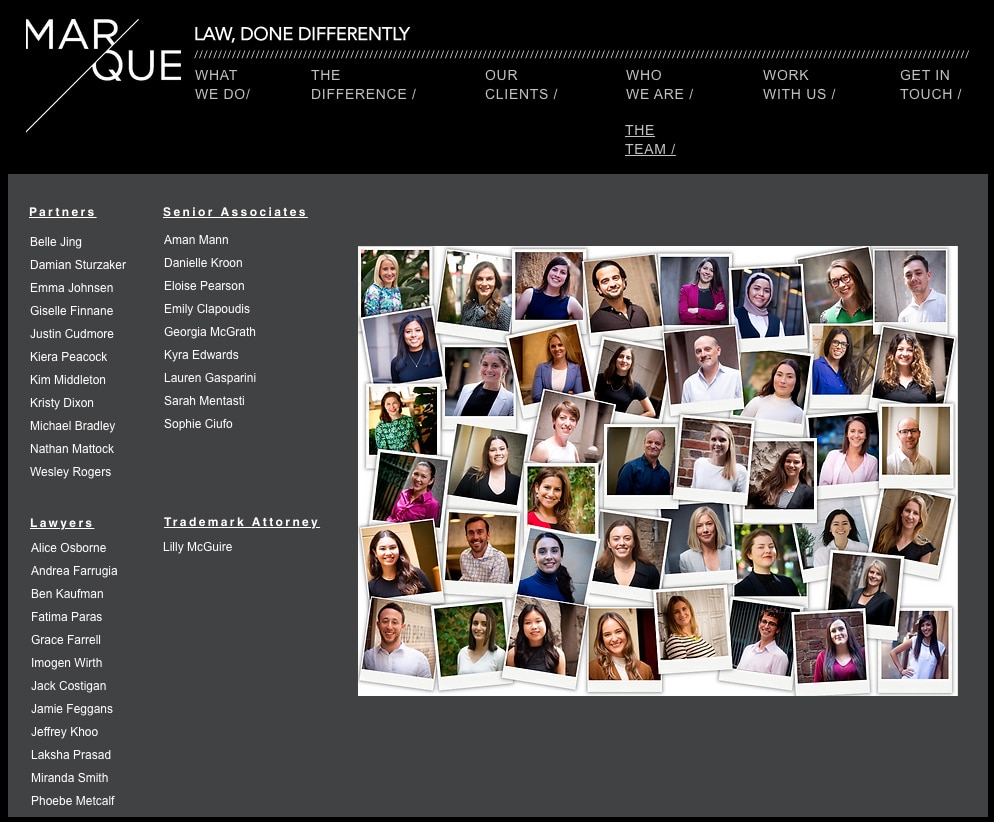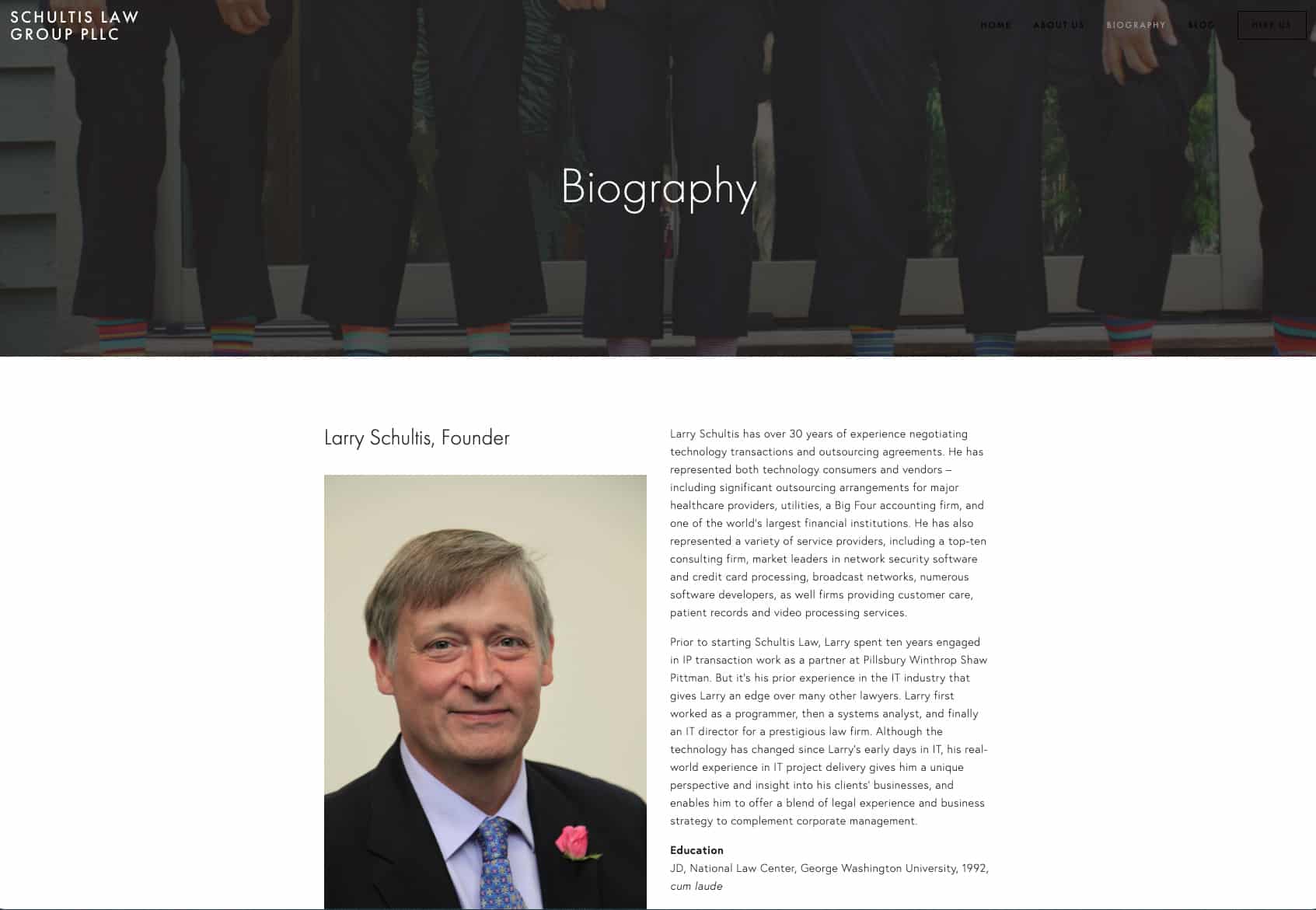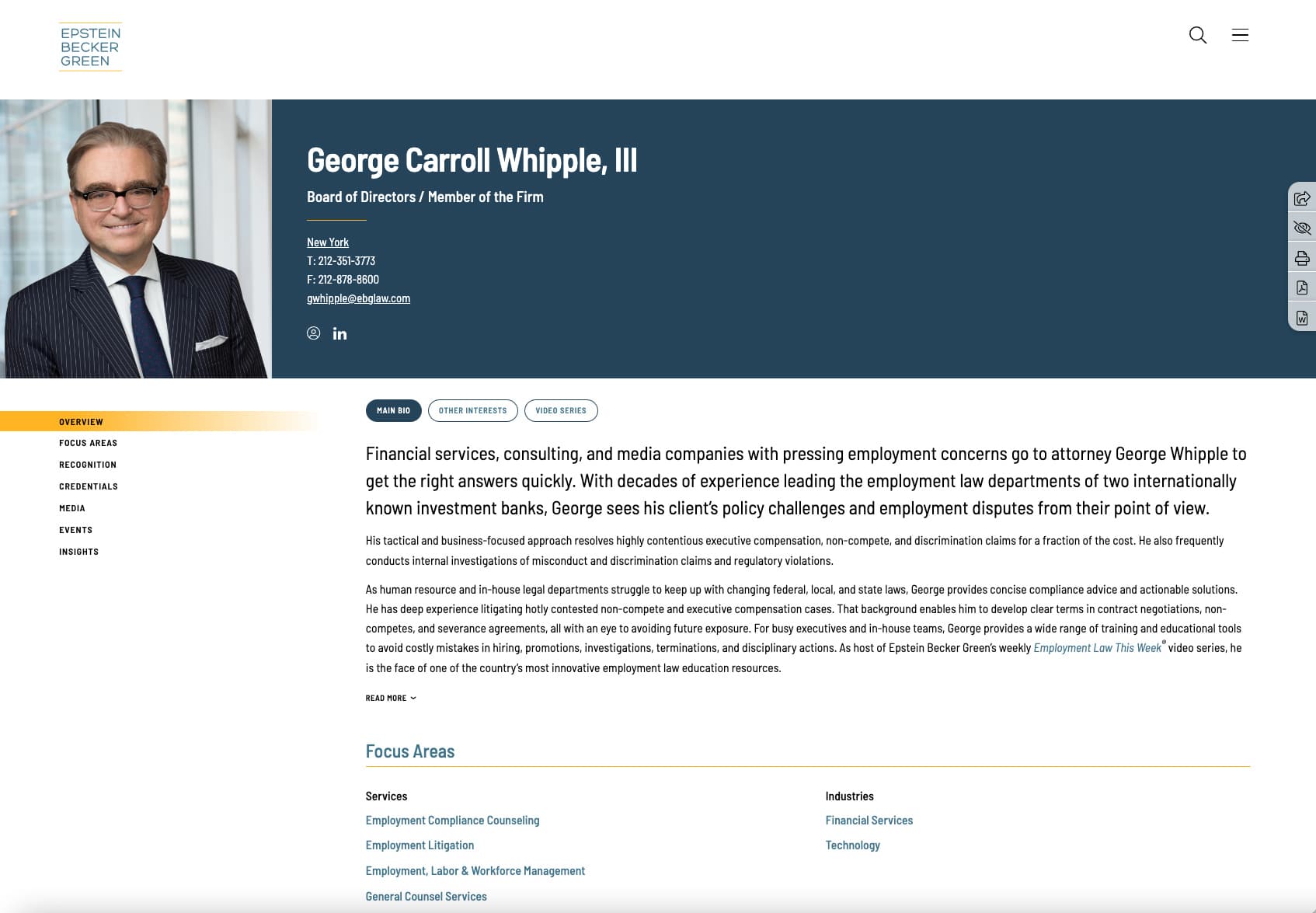Nobody sets out to write a boring bio. Here are the steps you can take right now to infuse authenticity and some fresh ideas into your attorney bio.

Key Takeaways
- Why Attorney Bios Matter: Attorney bios are key on law firm websites as they convert site visitors into potential clients. They get a big chunk of legal website traffic and in-house counsels rely on them when selecting outside counsel.
- Writing a Good Bio: A good bio should include a professional headshot, background and experience summary, practice areas, credentials and a personal statement. This builds trust, showcases expertise and differentiates the attorney from others.
- Be Human: Add personal qualities, community involvement and relatable stories to an attorney bio to build trust and connection with potential clients. This makes the attorney more human and more approachable which is key to building strong relationships.
It’s just so easy to follow the usual attorney bio format and rarely update or change it (unless there’s a big pitch underway or your law firm’s website is being redesigned).
Attorney biographies are crucial pages on a law firm’s website, playing a significant role in converting visitors into potential clients. Attorney bios account for a substantial portion of legal website traffic, with a high percentage of in-house counsels relying on them when researching and selecting outside counsel. Your bio becomes an end product of your CV — told in prose form. Those rock-solid credentials and impressive accomplishments get lost among ordinary verbs and uninspired adjectives.
Too many attorney bios start with the all-too-familiar, “Mr. Jones is a lawyer in the firm’s ABC group. His practice focuses on _____ .” (Cue Charlie Brown’s teacher’s mwah-mwah voice.)
Is Your Attorney Biography Really That Important?
If you want your attorney biography to help close the deal and build client trust and engagement, yes, it is important. Let’s look at some recent statistics:
- Attorney bios rank second in terms of influence on hiring selection by general counsel. (The No. 1 spot belongs to personal recommendations.)
- Attorney bios account for 80% of legal website traffic.
- And 78% of in-house counsels rely on attorney bios when researching and hiring outside counsel.
On law firm websites, attorney bios are crucial content. They are often the first point of interaction for potential clients, helping to establish credibility and connection, ultimately influencing their decision to seek legal representation. A well-organized law firm’s website can enhance the user experience and improve client engagement.
OK, So Show Me a Good One
Here’s the phenomenal opening paragraph, plus the closing sentence, from the bio of Nathan Mattock of Australia’s Marque Lawyers:

“After a string of high-profile cases involving telecommunications giants and, umm, adult content, Nathan would be famous enough as a major case litigator even without the three High Court cases he’s run and his appearance on TODAY where he delivered the immortal quote ‘It’s game over, Sony.’
“… Clients love him because he’s commercial, confident, fast, and entirely entertaining.”
Clearly, this is not the right approach for all lawyers, but it is authentic and very fresh. The entire website, written by Michael Bradley, Marque Lawyers’ managing partner, is worth a look. It helps that Bradley happens to be a clever writer. The rest of the Marque Lawyers site conveys their confidence (without being overly braggadocious) throughout the bios, the practice area descriptions, and especially their home page. The bio page incorporates design elements that enhance user experience and personalization, making essential information easily accessible for prospective clients.

Law firms must develop attorney bios that balance consistency with individual personality, blending professional credentials with a personal touch to effectively engage potential clients.
Seven Steps to a Better Attorney Bio

Now, if you’re thinking, “Sure, Nathan’s attorney bio sounds great, but I’m a tax attorney and my clients would not take me seriously,” your point is well taken. If you’re not ready to go that far afield, here are seven steps you can take right now to infuse authenticity and some fresh ideas into your bio:
1. Lose those overused and uninspired phrases.
While you may have great credentials and impressive accomplishments, a lackluster construction will render you virtually indistinguishable from the other lawyers your prospects are considering.
- “His/her/their practice focuses on ….” We ran a Google search and this phrase appears 174,000 and 92,000 times, respectively.
- “He/she is uniquely qualified.” That’s right, you and a couple hundred thousand other lawyers out there are “uniquely qualified.”
- “Handles a variety of complex ….” This phrase appears 40,000 times in mostly lawyer-related pages. To differentiate, identify the specific variety (a couple of bullets work well here), and then show how you advised on or solved your clients’ complex matters.
2. Begin your bio by answering a burning question.
Think about the most frequently asked question within your law practice. What does a client seeking your services most need or want? For example, “Clients often want to know … .” Or, flip it around and lead with the actual question.
3. How about a mini-case study?
If there’s a recent and relatable story that will resonate with your prospects and clients, then share it! This doesn’t have to be the full-on Harvard Business Review-length version; a couple of strong sentences will suffice to engage your readers.
4. You can write about yourself without being braggadocious.
The key is to infuse your bio with the right descriptors. Here’s a quick exercise to help you become more comfortable writing about yourself.
- Imagine you’re at a networking event and some colleagues spot you from across the room before you see them. What are they likely to be saying about you? Write down your answers, using only adjectives.
- Next, write a few sentences using those adjectives to demonstrate how you are those things. If your friends describe you as being “strategic” and “curious,” you might write, “Jane can identify issues well before the client even knows there’s a problem.”
5. Yes, your law school credentials are awesome.
But that doesn’t mean you reference your alma mater in the first sentence. Not gonna lie; we know it’s tough for first- and second-year associates who don’t yet have a lot of experience. Still, clients don’t want to be reminded that it wasn’t too long ago that you were living in a dorm and eating ramen.
6. Highlight your professional associations.
Listing your memberships and roles in professional associations showcases your engagement in the legal field. Mentioning specific contributions and active participation demonstrates your commitment to professional development and enhances your appeal to prospective clients.
7. The “Marcia, Marcia, Marcia” syndrome.
When 75% of the sentences in your attorney bio begin with your name, are you really demonstrating to the world how ”client-focused” you are? (Hat tip to Amy Spach for her terrific advice!)
Don’t Be Abstruse
Your prospects and clients want to know details. Veiled descriptions of clients’ identities may be required, but if you have published articles about matters that are germane to your client’s business, you should refer (or link) to one in the prose section of your attorney bio.
Above All, Be Authentic
Your prospects and clients need to know that you believe what you’re saying (or writing). Does your attorney bio truly reflect how you feel?
Authentic is not just a buzzword. It’s the key to securing new business in an overcrowded and noisy marketplace. Let your clients and prospects learn a little something about who you really are. After all, people hire people they know, like and trust.
More Great Attorney Bio Examples
This lawyer walked a mile in his client’s shoes. “But it’s his prior experience in the IT industry that gives Larry Schultis an edge over many other lawyers. Larry first worked as a programmer, then a systems analyst, and finally an IT director for a prestigious law firm. Although technology has changed since Larry’s early days in IT, his real-world experience in IT project delivery gives him a unique perspective and insight into his clients’ businesses and enables him to offer a blend of legal experience and business strategy to complement corporate management.” Well-crafted bios like Larry’s connect clients with legal professionals by showcasing their unique backgrounds and expertise.

Now that’s fresh. New Yorkers will recognize George Whipple, the bushy eye-browed media darling, from his NY1 TV “On the Town” segments. But who knew he was also a lawyer? George’s bio includes links to his regular client-related video series, “Employment Law This Week.” Highlighting specific areas of practice, such as personal injury, is crucial in showcasing an attorney’s expertise and reassuring potential clients about their capabilities.

Doesn’t get more authentic than this. “Vinita Mehra is an attorney who cares — about her clients and her community. Her professional and personal philosophy includes giving back in ways that make a meaningful difference to the local and global communities to which she dedicates her practice. Vinita is a firm believer in Gandhi’s idea of ‘being the change you want to see in the world.’”

Additional Tips on Crafting a Great Attorney Bio
Understanding the importance of attorney bios.
Attorney bios are important for a law firm’s online presence, serving as a digital introduction to possible clients. These bios not only showcase the attorneys’ qualifications and personality but also reflect the law firm’s values and culture, which can significantly impact client engagement and conversion rates. A well-crafted attorney bio can establish trust, showcase expertise, and differentiate a lawyer from competitors.
Establishing trust with prospective clients.
A professional attorney bio helps build trust with potential clients by providing a personal and relatable introduction to the lawyer. By sharing their background, experience, and approach to the practice of law, attorneys can establish a connection with clients and demonstrate their commitment to their cases. This personal connection is often the first step in building a strong attorney-client relationship, which is essential for successful legal representation.
Showcasing expertise and experience.
An attorney bio is an opportunity to highlight a lawyer’s expertise and experience in their practice area. By showcasing their achievements, credentials, and relevant experience, attorneys can demonstrate their ability to handle complex cases and provide effective representation. Whether it’s a landmark case, a prestigious award, or a unique skill set, these details can help prospective clients feel confident in the attorney’s capabilities.
Differentiating yourself from competitors in a law firm.
In a crowded legal market, a unique and compelling attorney bio can help differentiate a lawyer from their competitors. By showcasing their personality, values, and approach to the practice of law, attorneys can stand out from the crowd and attract potential clients who share their values and goals. This differentiation is key to building a distinctive personal brand that resonates with clients and sets the attorney apart in a competitive field.
Crafting a compelling bio.
A well-crafted attorney bio is essential for establishing trust and credibility with potential clients. It serves as a platform to showcase expertise, highlight credentials, and provide a personal touch that sets you apart from others in the legal profession. Your bio is often the first impression you make on prospective clients, so it’s crucial to make it count.
Starting with a professional headshot.
A professional headshot is a crucial element of an attorney bio. It provides a visual representation of the attorney and helps to establish a personal connection with potential clients. A high-quality headshot should be clear, well-lit, and convey a sense of confidence and approachability. When selecting a headshot, consider the following tips:
- Use a recent photo that accurately represents your current appearance.
- Choose a neutral background that does not distract from your face.
- Avoid overly formal or stiff poses, instead opting for a relaxed and natural expression.
- Consider hiring a professional photographer to ensure a high-quality image.
A great headshot can make a significant difference in how potential clients perceive you, making them more likely to reach out and engage with your services.
Highlighting credentials and honors.
Highlighting credentials and honors is an essential aspect of an attorney bio. It helps to establish credibility and trust with potential clients and demonstrates expertise in specific areas of law. When highlighting credentials and honors, consider the following tips:
- Include relevant educational background, such as law school and degree.
- Highlight any notable awards or recognition received.
- Emphasize any specialized training or certifications.
- Use clear and concise language to avoid overwhelming the reader.
By showcasing your achievements and qualifications, you can reassure potential clients of your competence and dedication to your field.
Emphasizing specializations, such as family Law.
Emphasizing specializations, such as family law, is crucial for attracting potential clients who are seeking specific legal services. When emphasizing specializations, consider th
Adding a Personal Touch
Adding a personal touch to an attorney bio is important for establishing a connection with potential clients. It helps to humanize the attorney and provides a sense of approachability and relatability. In a field where trust is paramount, showing a bit of your personality can go a long way.
Including personal qualities to enhance trust.
Including personal qualities to increase trust is a key aspect of an attorney bio. It helps to establish a personal connection with potential clients and demonstrates a sense of empathy and understanding. When including personal qualities, consider the following tips:
- Share personal values and beliefs to demonstrate alignment with client needs and priorities.
- Highlight community involvement and volunteer work to demonstrate commitment to service and giving back.
- Include personal anecdotes or stories to showcase personality and approachability.
- Use clear and concise language to avoid overwhelming the reader.
By sharing your personal qualities and values, you can create a bio that resonates with potential clients, making them feel more comfortable in choosing you as their legal representative.
A good attorney bio should be well-written, concise, and visually appealing. Here are some key elements to include:
- A professional headshot and contact information
- A brief summary of the attorney’s background and experience
- A description of their practice areas and expertise
- Relevant credentials, such as education and certifications
- A personal statement or quote that showcases their approach to the practice of law
- A call-to-action, such as a link to their contact page or a phone number
By including these elements, attorneys can create a compelling and effective bio that attracts potential clients and helps build their professional reputation.
More Bio-Boosting Tips on Attorney at Work
- In “10 Tips for a More Effective, Personable Bio” law firm media public relations guru Gina Rubel has great advice on what to include and what not to forget (SEO):
- Law firm content marketing expert Susan Kostal has the secret weapon for a great attorney bio: “Attorney Bios: Make LinkedIn Referrals Your New BFF”
- In “Create a Digital Trail to Your Website Bio” Jay Harrington lays out the case for using thought leadership to pull prospects back to your attorney bio.
Don’t forget to subscribe to Attorney at Work for one really good idea every day.
Illustration ©iStockPhoto.com
















